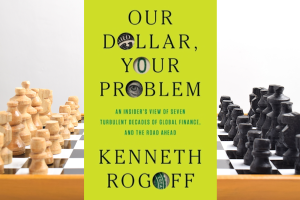“Unredeemably opaque”, so Alan Greenspan terms the operation of the invisible hand that guides international financial markets.
He means this literally. “The problem is that regulators, and for that matter everyone else, can never get more than a glimpse at the internal workings of the simplest of modern financial systems.” If he had said “hardly ever get” rather than “can never get”, I think we could all agree.
Indeed pretty much every economist I know thinks that a big part of the road forward is a much enhanced effort at data collection, so that in future we do get more than a glimpse. That is the whole point of the Financial Stability Oversight Council and the Office of Financial Research.
But Greenspan also thinks that, even if we do manage to get a glimpse, it would not help us much, because the system is “more complex” than we contemplate, on account of “the degree of global interconnectedness of recent decades.” Why collect data, if you will never be able to understand it?
To which I, and again pretty much every economist I know, would answer, What else is science but the possibly quixotic belief that application of effort and reason will eventually be sufficient to unlock the mysteries of the universe? Even if some mysteries remain beyond our ken, we can never know that in advance. If it looks like a big job, then best to get started, and if it is too daunting for you, then please step aside and give others a chance.
No question about it, Dodd-Frank is a patchwork product, a list of fixes for a list of dike-busting leaks. For lack of any overarching intellectual framework, there is no guarantee at all that the resulting regulatory structure will be internally consistent, and every expectation that it will provide ample scope for regulatory arbitrage of various kinds.
No question about it, Dodd-Frank is a product of Old Economic Thinking. Over the last 30 years, the U.S. has moved from a bank lending-based credit system to a capital market-based credit system. Dodd-Frank focuses its attention on the old system, with only a nod to the new one.
No question about it, Dodd-Frank is as much a political Act as it is economic. Like all epochal financial legislation, it was thrown together in a hurry in an attempt to show that our leaders are in charge. The real devil will be in the details—and very likely in a second legislative effort, if past history is any guide—to be worked out in the years to come.
We will of course have to understand the new system before we can properly regulate it. The place to start is by realizing that what others call ”
the shadow banking system” and I call “the dollar cross-border funding system” is not an aberration but the very heart of how the new system works. Data lags behind, and understanding lags even farther behind. Old intellectual habits continue to organize our conversation, but only for the time being, not forever.
One is tempted to turn the tables on Greenspan, noting the “unredeemably opaque” prose for which he was famous as chairman of the Fed. But I don’t think it is opaque, and certainly not unredeemably so, as I hope I have demonstrated. The author understands all too well the stakes that are in play at this epochal moment.
Put simply, the central issue is financial globalization. Complexity mostly arises from the cat-and-mouse game between bankers and regulators—the parallel construction is intentional—where bankers are global while the regulators are national. It follows that if the regulators were to stop regulating, the system would be a lot simpler.
But would it work better?
Greenspan concludes: “The vexing question confronting regulators is whether this rising share of finance has been a necessary condition of growth in the past half century, or coincidence. In moving forward with regulatory repair, we may have to address the as yet unproved tie between the degree of financial complexity and higher standards of living.”
Good question. Let’s address it. As I say, Greenspan calls for new economic thinking, but not by him.





